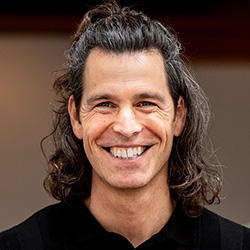

Search Results: practice
-
What exactly IS empathy? Empathy is the connection that happens between you and another when you experience your differences while holding on to underlying threads of commonality. In this recording, John will be sharing in-depth practices designed to give you the ability to speak and listen from a place of empathic presence, as well as a Self-Connection Practice specially formulated to help you come back to that empathy connection when you’ve gotten triggered into “fight-flight-freeze.”
-
How can we create a partnership and eye-level dialog with people who we perceive to have more power? In this session, we will create a practice of humanizing ourselves and others through empathy, practicing scary honesty, and making requests that serve both persons’ needs
-
-
If role play, hearing conversations modeled and dialogue practice is how you learn, this is the telecourse recording for you! Learn the art of entering, staying in and bowing out of the conversational dance using real-life situations.
-
Attraction to others is neither good nor bad. Although it's pleasurable it doesn’t necessarily help with wise discernment. When it arises, it's up to you to engage in wise discernment about how you manage it. This guide provides practices and points of focus to engage your own attraction in a way that holds more choice about what will meet needs for yourself and others, and what role attraction plays.
-
Living Compassion, for Robert, represents the spirituality that resides in every aspect of Nonviolent Communication. Its foundational principles are represented by three primary qualities or states of being: clarity, compassion and empowerment.
In this course you’ll explore – and practice – how the unfolding of inner clarity opens your way to compassion, which further unfolds into empowerment. Throughout this unfolding process, Robert will include maps and tips for shifting your everyday life from one that is relatively limiting to a life that is both transformative, healing and liberating.
-
Mediating a conflict conversation can be challenging – but with tools and practice, that challenge can be transformed. If you're curious about the specific steps needed to achieve that transformation, join John for an exploration of his non-dual mindfulness practice.
-
The heart of the practice of nonviolence is a commitment to live through the powerful combination of compassion, fierceness, and courage, with an uncompromising willingness to stand for truth. Join Miki Kashtan for this exciting and informative course to learn how to practically embrace nonviolence.
-
Join Dian Killian and discover the power of imagery and metaphor in deepening your empathy practice. This segment from her 6 session course explores how visualizing sensations, emotions, and needs through metaphorical language can enhance the connection during empathy guessing, particularly in somatic-based approaches.
-
Certified NVC Trainer Aya Caspi describes Nonviolent Communication (NVC) as a restorative practice—one that reconnects us with life, trust, and the experience of mattering. She reflects on Marshall Rosenberg’s vision of NVC as a “language of life,” helping us shift from disconnection to connection, from distrust to trust.
-
True inner freedom arises from self-connection. Without self-connection, we're mostly acting from habits, and those habits do not necessarily attend to our own needs. Here's a practice you can explore in your daily life to deepen your relationship with yourself, and experience true choice and inner freedom.
-
With these exercises you can practice identifying the reactions to conflict, such as fight, flight, freeze, the posture taken, what you see, hear, smell, touch taste and what needs are at play. They will also bring in curiosity about what next step may help. One of these exercises prompts you to journal some of these things this week.
-
With practice we can prevent reactivity from overtaking and harming: notice signs of reactivity, bring compassion to it, see reactivity as the misperception of threat and a distortion of what's happening, plus engage and pursue connection and the clarity to weaken reactive impulses. In taking responsibility like this overtime, you can live from your values and from care. And life can get easier for you and others around you.
-
Even those who practice NVC can repeat old patterns of thinking, believing, feeling, and behaving. If they do, but still use ‘NVC language’ others may think the issue is NVC rather than the person’s capacity. This week, notice even a small instance where someone is against something you suggest. To build trust and connection, experiment with offering empathy or asking them to share what they think, feel, or need.
-
In this practice group class, certified CNVC trainers Jim and Jori Manske are facilitating the exploration of the topic of Mourning using the three modes of NVC: self-empathy, honesty and empathic presence. You'll learn how to accept a loss, let yourself feel the sadness and all the emotions, and allow yourself to grieve.
-
When feeling unworthy, powerless, or afraid, we can hear others' comments as criticism, rejection, demands, limits, or attacks. Practice self-compassion, release attachments, and ask “How can I stretch the boundaries of who I believe myself to be, in service of love?”. Try replacing love with a word that inspires you (e.g. freedom, thriving, etc). Note answers that arise later. Or explore the question with a trusted person or in a journal. Read on for examples.
-
Ask the Trainer: "Fairness" isn't on the needs list. What needs might be underneath it?
-
LoraKim Joyner addresses the sense of overwhelm that can accompany holding the needs of the many. Practicing self-empathy is a pathway to living in the tension of mutually holding my needs and the needs of others.
-
How do you solve a conflict? By not trying to solve it! Yoram suggests building your conflict resolution muscles by practicing connecting to the needs behind the conflict instead. Check out this excerpt from Session 1 of his 2021 course, Connecting in Conflict and the Art of Navigating Dialogue. Listen.
-
Learn tools to help you reconnect and repair your relationship with your adult children. Whether the issues are estrangement, lack of trust, conflict, dependence, miscommunication or any other challenge that impacts you with your grown sons and daughters, your heart will find comfort and ease through this course.

Quick Links
Subscription Preferences
Stay In Touch!
Looking for ways to keep up with NVC Academy news, get special offers, free resources, or words of inspiration? Here are five ways to stay engaged:



















